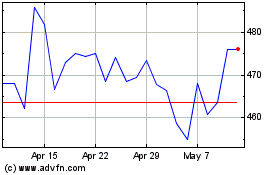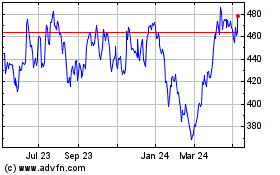Zambia Unveils Austerity Measures
November 27 2015 - 10:50AM
Dow Jones News
KAMPALA Uganda—Mineral-rich Zambia has announced a program of
austerity measures to try to close a gaping budget deficit and
restore confidence in southern Africa's third-largest economy amid
a global commodity bust and crippling power blackouts.
The proposed measures, which include scrapping subsidies on
gasoline and diesel, will save the state $300 million, the Zambian
presidency said Friday.
Other measures include suspending new road projects, banning
nonessential foreign travel by government officials, and postponing
the creation of a national airline, initially scheduled for next
year.
"In light of the recent financial challenges, the financing of
ambitious infrastructure development programs has to be realigned
to ensure budgetary sustainability" President Edgar Lungu said in a
statement.
The moves come as inflation runs at close to 20%, the highest
level in more than a decade, and the value of the local currency is
down more than 40% against the dollar since the start of the
year.
Subsidies on electricity and agricultural inputs are also being
reviewed as the price of copper—which accounts for the bulk of
Zambia's export earnings â "hovers around its lowest level since
the 1998 financial crisis.
Concerns are rife that the belt tightening could drive prices
still higher, triggering social unrest. In the 1990s, a series of
riots over high food prices toppled the government led by President
Kenneth Kaunda.
The austerity measures are the outcome of days of cabinet
meetings after the International Monetary Fund said Zambia needed
to bridge its budget deficit.
"The Zambian economy is under stress," IMF mission chief to
Zambia Tsidi Tsikata said last week. "Fiscal discipline has been
undermined by additional spending commitments that stand in
contrast to lower-than-budgeted revenues."
After more than a decade of unprecedented growth, boosted by
investment from major miners such as Glencore PLC, First Quantum
Minerals and Vedanta Resource PLC, Zambia is expected to grow at
its slowest pace since 1998, weighed down by weak copper prices,
according to World Bank data.
The reversal of fortune shows how volatility in global resources
markets can have far-reaching consequences in a country whose
economy relies heavily on a single commodity.
This week, Glencore and Vedanta Resource, which operate Zambia's
largest copper operations, cut more than 6,500 mining jobs in the
country as part of efforts to stem escalating costs. The Zambian
finance ministry expects copper output to drop below 700,000 metric
tons for the first time in five years as miners scale down
output.
But Mr. Lungu has warned that miners should be prepared to pay
higher tariffs as hydropower-dependent nations like Zambia import
electricity to make up for a generating shortfall, due to low water
levels caused by drought.
Zambia forecast the budget deficit would widen to 6.9% of gross
domestic product this year, from 4.6% in 2014, although some
analysts expect it to reach as high as 8.4% of GDP.
Analysts say inflation may average over 20% in 2016 due to weak
copper prices as well as the effects of El Niñ o-induced
drought.
Irmgard Erasmus, an analyst with NKC Economics in Zambia, said
the effects of weak copper prices on Zambia could be prolonged.
"Copper price may make a moderate recovery in 2016 but this may
be well below the incentive price for high-cost mines in Zambia,"
Ms. Erasmus said, referring to a price level that would motivate
miners to restart paused operations.
Write to Nicholas Bariyo at nicholas.bariyo@wsj.com
Subscribe to WSJ: http://online.wsj.com?mod=djnwires
(END) Dow Jones Newswires
November 27, 2015 10:35 ET (15:35 GMT)
Copyright (c) 2015 Dow Jones & Company, Inc.
Glencore (LSE:GLEN)
Historical Stock Chart
From Mar 2024 to Apr 2024

Glencore (LSE:GLEN)
Historical Stock Chart
From Apr 2023 to Apr 2024
